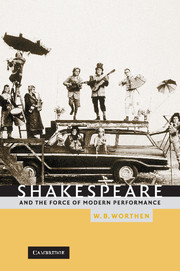1 - Performing history
Published online by Cambridge University Press: 22 September 2009
Summary
This theatre reminds many people of Shakespeare's Globe; my only question is, can we use it for playing Shakespeare?
Freddie Rokem, Discussion sessionWhen Stephen Greenblatt confessed “a desire to speak with the dead” in Shakespearean Negotiations (1), he expressed a common longing, a hunger that has also shaped the most notorious theatre built in recent memory: Shakespeare's Globe Theatre on London's Bankside. The texture of the structure promises to satisfy an appetite for such discourse with the dead, or at least with the creations of the dead – Hamlet, Ophelia, Shylock, and so on. An early modern structure frames the return of early modern subjects and the force of their actions onstage. In its meticulous reconstruction of building practices and ongoing research into the use of period costumes and staging, the Globe reflects a desire to see performance releasing original Shakespearean meanings; the Globe is a monument to an understanding of dramatic performance as the embodiment of a textualized past, expectantly awaiting the chance to speak. At the same time the Globe also enacts the ineluctable presentness of performance, the ways performance speaks with a difference. Despite the oak and plaster, the Globe is everywhere traced by the passage of history: it is down the street from the original foundations; it holds fewer, bigger, and quite different people; the hair-and-lime plaster uses goat hair (cow hair today is too short); the thatch is chemically treated; the lath and plaster conceals a modern firewall; sprinkler heads dot the ridgepole; the exterior timbering is whitewashed, a concession to modern “Tudor” sensibilities; there are actresses, intermissions, numbered seats, toilets, ushers, ice cream, a restaurant, a cafe, a gift shop.
- Type
- Chapter
- Information
- Shakespeare and the Force of Modern Performance , pp. 28 - 78Publisher: Cambridge University PressPrint publication year: 2003



